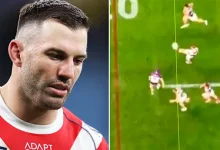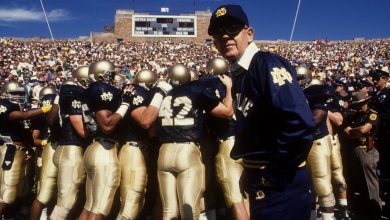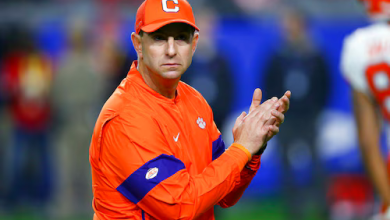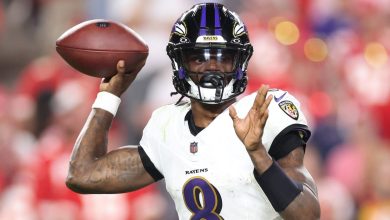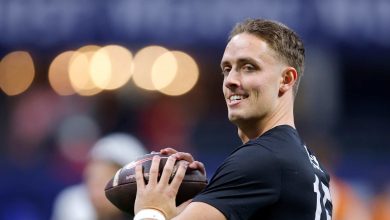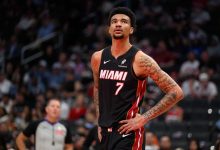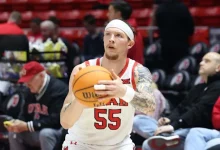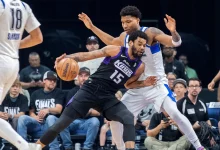By taking on a position that isn’t his, LeBron James puts his future with the Lakers in danger.
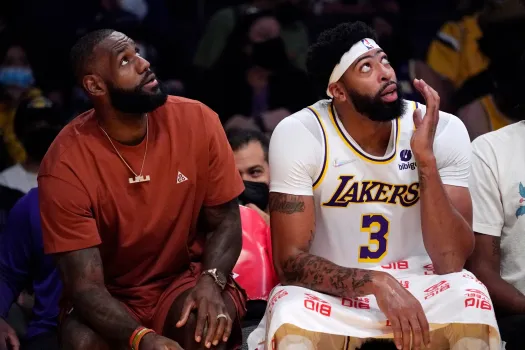
LeBron James has long been regarded as one of the most versatile and dominant players the NBA has ever seen. His basketball IQ, unmatched physical attributes, and ability to lead teams to championships have earned him the title of one of the greatest players in the history of the sport. However, as LeBron’s career advances, his impact has begun to transcend the basketball court. LeBron’s leadership, his influence in roster decisions, and his increasing control over team operations have started to raise concerns about his future with the Los Angeles Lakers.
For much of his career, LeBron has taken on the role of a player-coach, managing the on-court product with an unyielding desire to lead his team to victory. His influence has extended into the front office, where he has weighed in on key decisions about the makeup of his teams. While this has led to success in several stints—most notably with the Miami Heat, Cleveland Cavaliers, and the Los Angeles Lakers—the evolving nature of LeBron’s role has the potential to put his future with the Lakers in serious jeopardy. His increasing desire to assume a position that isn’t truly his, namely that of a de facto general manager, could come at the expense of the Lakers’ long-term strategy and stability.
In this article, we will explore how LeBron James’s desire to control more than just his on-court performance could ultimately undermine his legacy, his relationship with the Lakers, and his career. From his overreach in roster construction to the physical toll of attempting to balance multiple roles, LeBron’s decision to take on a position that isn’t his could be damaging to both himself and the team.
LeBron’s Early Career: A Player Who Assumed Leadership
From the moment LeBron James entered the NBA in 2003, it was clear that he wasn’t just a typical rookie. Even as a 19-year-old, his basketball IQ, passing ability, and leadership on the court were already well beyond his years. In Cleveland, he quickly became the focal point of the team’s offense, defense, and overall strategy. His ability to carry a franchise and elevate his teammates to greater heights became a hallmark of his career.
It was during his time with the Miami Heat that LeBron’s influence extended beyond the court. By joining forces with Dwyane Wade and Chris Bosh, he created the “Big Three” that reshaped the way NBA teams thought about building championship-caliber rosters. LeBron’s leadership in Miami was more than just on-court performance. He helped orchestrate the roster moves and played a central role in creating a culture of winning. The Heat won two NBA titles in four seasons, with LeBron taking home the Finals MVP in both championships.
When LeBron returned to Cleveland in 2014, his role expanded again. Now, LeBron was not just the franchise player but also an informal front-office decision-maker. His relationship with the Cavaliers’ general manager, David Griffin, was instrumental in the team’s ability to attract talent that complemented LeBron’s unique playing style. The acquisition of Kevin Love and the signing of key role players like J.R. Smith helped LeBron’s Cavaliers to an NBA championship in 2016, breaking Cleveland’s 52-year title drought. LeBron’s ability to influence roster construction, along with his play on the court, ensured the Cavaliers remained in championship contention during his tenure.
LeBron’s leadership went beyond just his on-court play. He became known for his ability to shape the teams around him, pushing for trades and player acquisitions that he believed would give him the best chance of winning another championship. However, this influence over the roster and team strategy has come with its drawbacks.
LeBron’s Role in the Los Angeles Lakers
When LeBron signed with the Los Angeles Lakers in 2018, it marked a new chapter in his career, both professionally and personally. Joining the Lakers, a franchise with an immense legacy, gave LeBron an opportunity to not just build a championship contender, but to cement his legacy as one of the NBA’s all-time greats.
Right from the start, LeBron was involved in shaping the roster. In 2018, the Lakers were in the middle of a rebuild, with young players like Brandon Ingram, Lonzo Ball, and Kyle Kuzma forming the foundation of the team. But LeBron’s arrival signaled an immediate shift in expectations. While LeBron’s primary responsibility was to lead the team on the floor, he quickly became a key figure in roster discussions. The Lakers traded away several of their promising young players in 2019 to acquire Anthony Davis, which was seen as a move aimed at giving LeBron the championship help he needed.
The 2020 season was a testament to LeBron’s leadership and ability to push the Lakers to greatness. He led the Lakers to their 17th NBA title, tying the franchise with the Boston Celtics for the most championships in NBA history. LeBron’s pairing with Davis proved to be an instant success, and the Lakers were able to rise above the chaos of the COVID-19 pandemic to claim the title.
However, even during this championship run, LeBron’s influence in the Lakers’ front office became increasingly apparent. LeBron pushed for the acquisition of players that he believed would put the Lakers in a position to repeat, including Russell Westbrook in the 2021 offseason. The decision to acquire Westbrook, a ball-dominant player with a track record of poor fit alongside other superstars, ultimately backfired. The Lakers’ chemistry suffered, and the team struggled to meet expectations, falling short of competing for another championship.
This was a key turning point, as it became clear that LeBron’s desire to influence roster decisions—particularly ones that don’t fit the team’s long-term plans—was beginning to backfire. His decision-making process, which previously worked in his favor during his Miami and Cleveland days, was now putting his future with the Lakers at risk. By continuously taking on responsibilities that weren’t traditionally his, such as controlling the team’s roster and front-office decisions, LeBron’s role became more complex and increasingly contentious.
LeBron’s Influence Over Roster Decisions: A Double-Edged Sword
LeBron’s tendency to play a key role in team-building is rooted in his deep understanding of the game and his unmatched ability to assess talent. Throughout his career, he has advocated for the acquisition of players who complement his playing style, and he has successfully recruited players to join his teams.
However, this influence has started to hurt the Lakers’ long-term prospects. The Westbrook trade in 2021 is the prime example of this. While LeBron may have believed that the addition of Westbrook could bring energy and leadership, the trade disrupted the team’s chemistry and didn’t account for the incompatibility between Westbrook’s playing style and the Lakers’ needs. The Lakers quickly realized that the trade had severely hampered their salary cap flexibility and roster construction, forcing them into a rebuilding situation earlier than anticipated.
LeBron’s role in roster construction continues to be a source of frustration. The Lakers, who have an aging roster, have faced difficulty in acquiring the right players to complement LeBron’s skill set and take the burden off his shoulders. While LeBron remains an elite player, he cannot single-handedly carry the team for an entire season, especially in an era where the NBA’s talent pool is deeper than ever. By taking on the role of roster architect, LeBron risks undermining the Lakers’ future by ignoring the importance of long-term roster stability in favor of short-term success.
This trend of prioritizing immediate championship contention over long-term planning not only affects LeBron’s legacy but also creates significant tension with the Lakers’ front office. The franchise is now stuck in a delicate position, attempting to balance the desires of their star player with the financial realities and the need for a sustainable, competitive team moving forward.
The Physical Toll: LeBron’s Career Longevity
LeBron James has defied the odds when it comes to longevity. As he approaches his 40s, he continues to play at an elite level, but the physical toll of his career is becoming increasingly evident. LeBron has already logged over 50,000 minutes of basketball, and while he has taken extraordinary care of his body, it is inevitable that his physical condition will begin to deteriorate.
By taking on the responsibilities of not just a player but also a de facto general manager, LeBron is adding even more stress to his body and mind. The effort required to manage on-court performance, along with the increasing demands of decision-making off the court, could hasten the physical decline that every athlete faces in the latter stages of their career. Already, LeBron has been forced to miss games due to injury, and he will likely have to manage his minutes more carefully in the coming seasons.
As LeBron’s physical abilities inevitably decline, his role as a player-coach and roster decision-maker becomes less sustainable. By continuing to take on responsibilities beyond his playing duties, LeBron risks compromising his ability to perform at the high level that has defined his career.
The Future of LeBron and the Lakers
LeBron James’s future with the Los Angeles Lakers will depend on his ability to manage his role within the organization. If he continues to take on responsibilities that are outside his job description, particularly when it comes to roster management and decision-making, his relationship with the Lakers could become strained. Tensions between LeBron and the front office could escalate, especially if the team struggles to maintain competitive balance due to his overreach.
Moreover, the Lakers’ front office will have to determine how to handle the balance between respecting LeBron’s influence while ensuring that the team’s future is not compromised by short-term goals. The Lakers are a storied franchise with a rich history, and they need to ensure that they have a sustainable model for success in the post-LeBron era.

